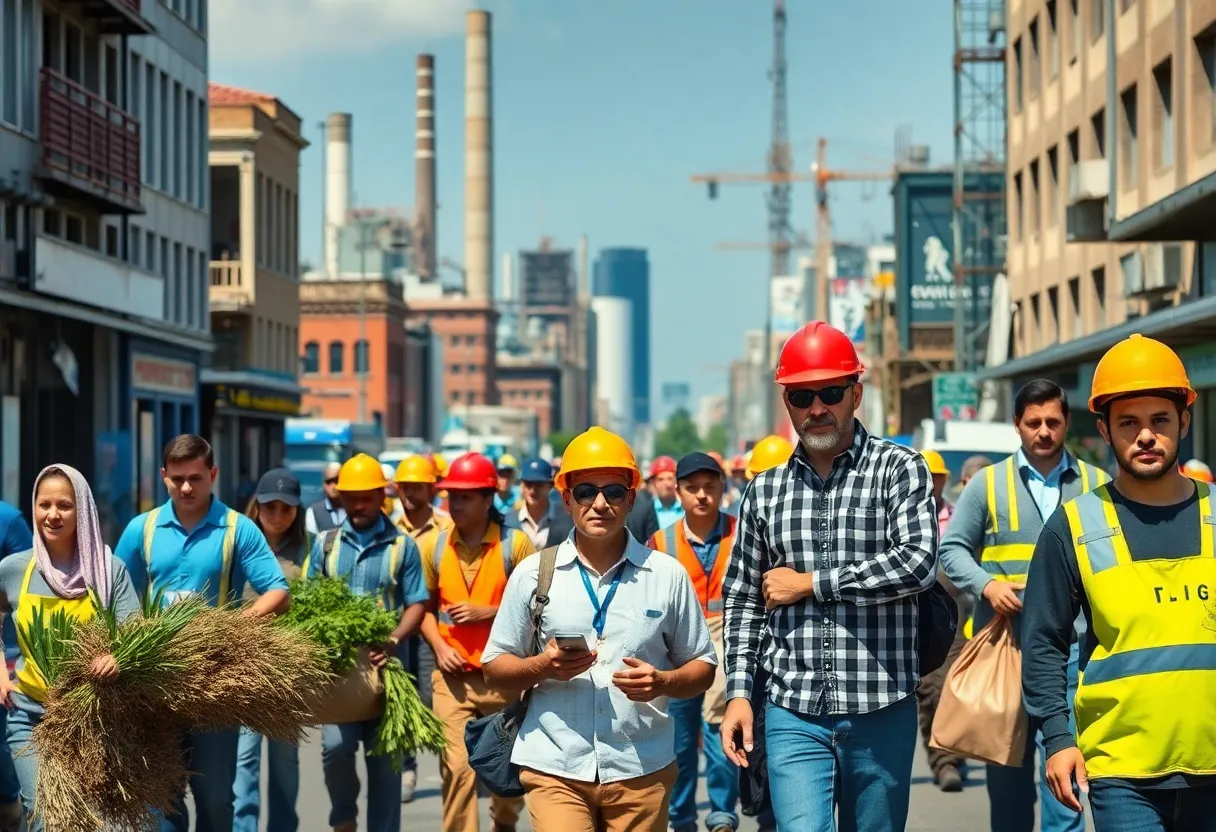News Summary
The Trump administration is confronted with significant legal battles and economic repercussions due to its stringent immigration policies. A recent federal appeals court ruling against expedited deportations highlights concerns about due process for undocumented immigrants. The impact of these policies is particularly felt in states like California, where potential mass deportations threaten the agricultural sector and overall economy. As the administration grapples with judicial scrutiny and labor market needs, the debate over immigration enforcement and its implications for society intensifies.
Atlanta, Georgia – President Donald Trump’s administration is facing significant legal and economic challenges as its strict immigration policies and enforcement crackdowns are put to the test. A federal appeals court recently ruled against using the Alien Enemies Act of 1798 to expedite deportations of alleged Venezuelan gang members, raising questions about the constitutionality of the administration’s approach to immigration. Additionally, concerns over due process rights continue to mount as thousands of undocumented immigrants face removal, sparking a heated debate regarding the implications for the U.S. economy and society.
Under Trump’s immigration policy, the administration aims to deport millions of undocumented immigrants, launching what has been described as the largest deportation program in U.S. history. As part of this initiative, officials have deported over 250 presumed gang members to El Salvador, causing unease among civil rights advocates who argue that these actions violate due process protections and could result in returning individuals to countries where they have no connections.
In a recent immigration raid at a South Korean-owned electric vehicle battery factory in Georgia, President Trump indicated a need for foreign experts to train U.S. workers, citing a lack of domestic knowledge about battery production. This remark highlights the struggles within the labor market, especially in industries reliant on immigrant workers. Research suggests that immigrants, particularly from undocumented backgrounds, play a crucial role in sectors like agriculture and construction—critical components of the U.S. economy.
California, in particular, is poised to face significant economic losses from potential mass deportations, with estimates suggesting a GDP loss of up to $278 billion. Currently, about 63% of agricultural workers in California are immigrants, of which approximately 24% are undocumented. The state’s economy heavily relies on this labor force, leading many local business owners to express significant concerns over the future viability of their operations amid current immigration enforcement policies.
In addition to the challenges posed to the labor market, the administration’s aggressive tactics have triggered various legal battles. Courts have blocked attempts to expedite removal processes, arguing that such measures undermine fundamental due process rights. Moreover, ongoing litigation has arisen from Trump’s executive order seeking to redefine birthright citizenship under the 14th Amendment, which has faced pushback from several states. A federal appeals court reaffirmed the original Citizenship Clause of the Constitution as a defense against this order, emphasizing that the protections offered by it cannot be easily dismissed.
Efforts to abolish Temporary Protected Status (TPS) for over 1.5 million individuals have also encountered legal scrutiny, resulting in recent court decisions that restored protections for about 1.1 million Venezuelans and Haitians. This situation illustrates the ongoing and sometimes contentious relationship between the current administration’s policies and judicial oversight, particularly regarding the treatment of immigrants and their rights.
Efforts to amend visa programs such as the H-2A for agricultural workers are underway, which could introduce a ‘touchback’ provision allowing these workers to return legally to the U.S. Although these adaptations aim to address labor shortages in agriculture, they also highlight the administration’s conflicting stance on immigration enforcement and labor needs. Meanwhile, proposals to alter the H-1B visa lottery system by ranking applications based on salary have raised concerns regarding their fairness, particularly for younger professionals seeking opportunities in crucial sectors such as science and technology.
Reports from local businesses, especially in areas like downtown Los Angeles, reveal that the tightening immigration restrictions have led to a dramatic market impact, with some local restaurants experiencing a 70% drop in sales. The pervasive atmosphere of fear surrounding immigration raids has deterred immigrant workers from engaging in their routines, thereby stifling economic activity across multiple sectors.
As the Trump administration continues to navigate its immigration agenda amidst a backdrop of legal challenges and economic ramifications, it remains to be seen how these policies will evolve. The balance between enforcing immigration laws and addressing the labor needs of the economy presents an ongoing dilemma for officials as the country grapples with these pressing issues.
Deeper Dive: News & Info About This Topic
- AP News: Trump Immigration Legal Challenges
- Wikipedia: Immigration in the United States
- NY Times: Jobs Report and Immigration
- Google Search: Trump Immigration Policy
- CNBC: Trump’s Immigration Policy in California
- Encyclopedia Britannica: Immigration
- Variety: Kim Kardashian on Trump’s Immigration Policy
- Google News: Trump Immigration Controversy

Author: STAFF HERE AUGUSTA WRITER
The AUGUSTA STAFF WRITER represents the experienced team at HEREAugusta.com, your go-to source for actionable local news and information in Augusta, Richmond County, and beyond. Specializing in "news you can use," we cover essential topics like product reviews for personal and business needs, local business directories, politics, real estate trends, neighborhood insights, and state news affecting the area—with deep expertise drawn from years of dedicated reporting and strong community input, including local press releases and business updates. We deliver top reporting on high-value events such as Arts in the Heart Festival, Westobou Festival, and Masters Week. Our coverage extends to key organizations like the Augusta Metro Chamber of Commerce and Greater Augusta Arts Council, plus leading businesses in manufacturing and healthcare that power the local economy such as Textron Specialized Vehicles, Cardinal Health, and Nutrien. As part of the broader HERE network, including HEREAtlanta.com and HERESavannah.com, we provide comprehensive, credible insights into Georgia's dynamic landscape.


